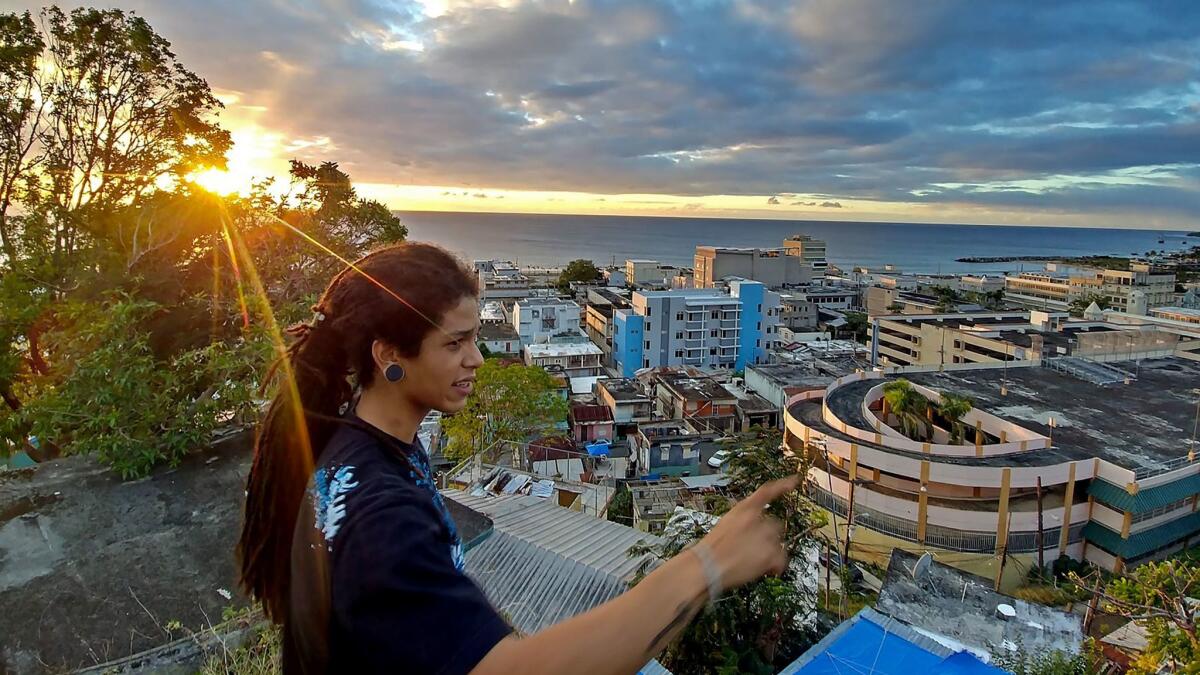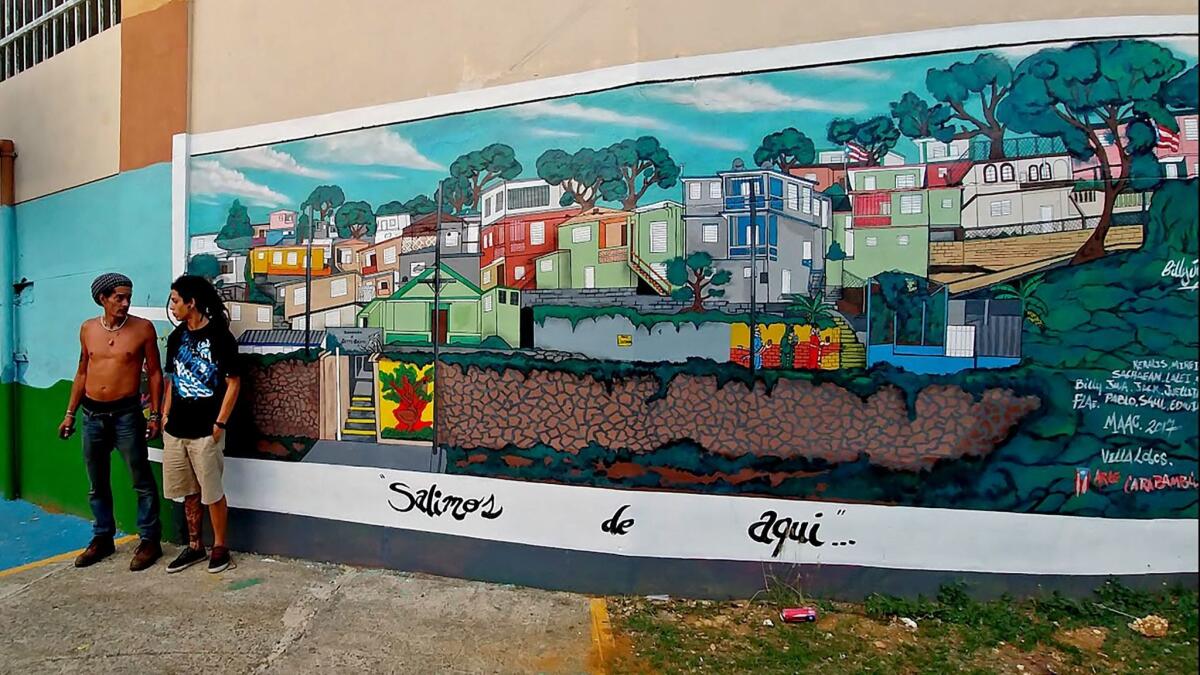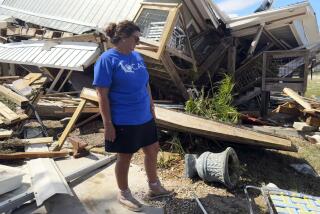Art and teamwork help one Puerto Rican town nearly five months after Hurricane Maria ripped through

- Share via
Reporting from Aguadilla, Puerto Rico — The Perez family’s guava-colored home stands out in the Cerro Calero section of Aguadilla, in northwestern Puerto Rico.
It’s not only the home’s faint pink exterior, or the roof, temporarily covered with a blue protective sheet, that make this house distinct.
It’s also not the extension cords coming from a neighbor’s house to power a few light bulbs and the refrigerator, or the fact that the cords sometimes double as clotheslines, that make people notice this house.
What truly catches the eye from outside the Perez home are murals painted between the two windows on the front wall. Indigenous Taíno symbols adorn the facade and side walls of the modest three-bedroom home, which the family says makes them proud and helps them overcome hardships.
“What’s painted there is part of who we are,” said 20-year-old artist Jwan Perez Ramos.
The Perez family, like many of the roughly 3.4 million Puerto Ricans on the U.S. territory, remains in recovery mode from the devastation that came when Hurricane Maria made landfall nearly five months ago. The Sept. 20 storm caused dozens of deaths, destroyed homes and left behind myriad other problems.
While thousands of residents, who are U.S. citizens at birth, relocated to the states, many stayed put and tried to do their best under conditions that have included lack of electricity and shortages of food and water. Many families remain worried about safety and what may happen next to their supplies of drinking water, medicine and power.
An explosion and fire at a substation on Feb. 11 left several areas, including parts of San Juan, temporarily in the dark. On Friday, officials said the island’s electric company would reduce power generation beginning Sunday while a federal control board seeks a $300-million loan for the company, even as nearly 400,000 customers have remained without electricity since September.
The Federal Emergency Management Agency, which has been criticized for its response to the hurricane, said last week that since the storm hit, the agency has distributed more than 68 million liters of bottled water and at least 62 million meals and snacks.
The agency also said key infrastructure improvements were signs that Puerto Rico was getting back on track. Despite difficulties, electricity and cellphone service have been restored to much of the island and nearly 90% of gas stations are operating, officials said.
Many analysts and officials say the island still faces a recovery process bound to take months at best. In Cerro Calero, the paintings by Perez Ramos and his father, Billy Joe Perez, aim to help brighten a thin alley leading to spectacular views of the sunset along the coastal area.

Two months after the storm, the father and son team painted a mural at the entrance of the neighborhood depicting the community the way it was before Maria. They looked up the hill at the entrance of Cerro Calero and created an image of the colorful homes as they were before the hurricane winds demolished the area, then inscribed it with the phrase: “Salimos de Aqui,” meaning “We came from here.”
“At least the people who live here can stop before going up and see it beautiful again,” the younger artist said.
Other murals by the elder Perez seen along the neighborhood’s entrance include a portrait of a deceased neighbor, Doña Ana, who he said was greatly missed during the holiday season.
Perez, 45, at times has been asked by the city to paint over murals but he still tries teaching others in the community to turn hardship into art, and relies on his neighbors for materials. He keeps an eye out when the neighbors are painting their homes and approaches them for supplies to complete his palette.
Support comes from others who appreciate his work and in some cases are taking their own steps to try to help in the hurricane recovery.
When Aguadilla artisan and painter Jenny Cruz heard of the efforts to bring art to the neighborhood, she pledged to help provide paint for the murals.
Cruz, 46, was also busy trying to find a home for a friend who she learned was sleeping under the bleachers of a basketball court in the nearby town of Rincon.
Another resident, Orlando “San” Gonzalez, a boxing coach with a reputation for taking in the toughest kids in the Cerro Calero neighborhood, decided to form a fighters brigade to help the elderly clean and rebuild their homes.
Gonzalez, 48, and his friend, businessman Gabo Sola, 31, and other professionals and volunteers help people in need, especially those who are most frail, through a nonprofit group called “We Are One.”
Gonzalez’s 22-year-old son, boxer Orlando “Capu” Gonzalez, recently returned from a fight in Kissimmee, Fla., with supplies of water and food, which were distributed in the community with help from other boxers.
When the boxers heard that Aguadilla resident Irene Mendez had lost her husband, Leonardo Enchautegui Flores, in an accident days after the hurricane, they vowed to help clean debris off her yard and home.
Mendez said Flores, 75, died after falling from the roof of their house while trying to fix damage caused by the hurricane.
“The hurricane took something from me that nobody can restore,” Mendez said.
But she said the boxers were kind to take time to think about the needs of the older people in the community.
For Manuel Medina Carrero of the Camaseyes section of Aguadilla, help and a dose of community unity came after he called radio newscaster Victor Vazquez during a recent interview with a FEMA official on WABA 850 AM.
Medina Carrero, 59, told the broadcaster he and his parents were hungry. He said the roof on his parents’ home had blown off during the hurricane.
Medina Carrero said he helps take care of his father, Maximino Medina, who is 84, and his mother, Iris Carrero, who is 79.
Hearing the family’s situation inspired Vazquez to go to the Medina home.
Vazquez, 42, contacted Sola and Cruz and together they secured a week’s supply of food for the family. Vazquez also called a friend who volunteered to fix the roof and someone from the neighborhood anonymously fixed the family’s 1991 Oldsmobile, which needed a new radiator hose.
The Medinas never found out who fixed the car, but it was a gesture of solidarity that brought Medina Carrero to tears. He also appreciated meeting the different people who offered their support for his family.
“The most beautiful thing was gaining their friendship,” he said.
Carrero Galarza is a special correspondent.
More to Read
Sign up for Essential California
The most important California stories and recommendations in your inbox every morning.
You may occasionally receive promotional content from the Los Angeles Times.










